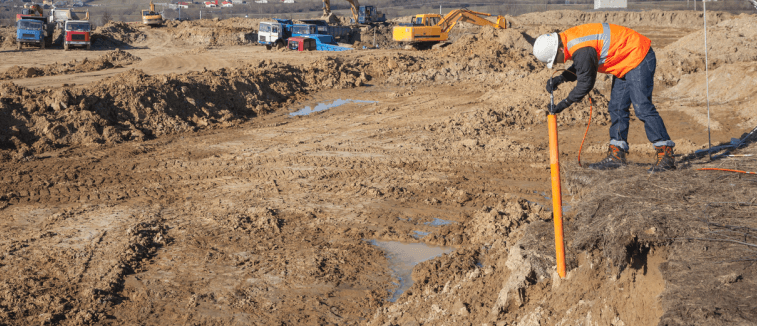The Buzz on Geotheta
The Buzz on Geotheta
Blog Article
How Geotheta can Save You Time, Stress, and Money.
Table of ContentsWhat Does Geotheta Do?The 10-Minute Rule for GeothetaSome Known Incorrect Statements About Geotheta About GeothetaExamine This Report about Geotheta

They conduct site examinations, collect examples, perform research laboratory examinations, and assess data to review the viability of the ground for construction tasks - Consulting Engineer. Based on their findings, geotechnical engineers offer suggestions for structure layout, incline stability, maintaining frameworks, and reduction of geotechnical dangers. They collaborate with other specialists, such as engineers, structural designers, and construction teams, to make certain that geotechnical factors to consider are incorporated into the overall task style and application
By assessing the habits and residential or commercial properties of dirt and rock, they can recognize prospective geotechnical threats such as landslides, dirt settlement, or slope instability. Their expertise aids avoid failings or mishaps that could endanger lives and residential property. Here are some thorough obligations and obligations of a geotechnical engineer: Website Examination: Geotechnical engineers conduct site examinations to collect data on subsurface problems.
They interpret the data to recognize the buildings and habits of the dirt and rock, including their strength, leaks in the structure, compaction features, and groundwater problems. Geotechnical Analysis and Layout: Geotechnical designers analyze the information accumulated throughout site investigations to examine the stability and viability of the site for building jobs. They carry out geotechnical calculations and modeling to examine factors such as birthing ability, negotiation, incline security, side planet stress, and groundwater circulation.
The Main Principles Of Geotheta
Structure Design: Geotechnical designers play a vital duty in making structures that can securely sustain the intended framework. They analyze the soil problems and tons demands to determine the appropriate structure kind, such as shallow foundations (e.g., grounds), deep foundations (e.g (https://gravatar.com/exactlypainterdeb7b76e1a)., heaps), or specialized methods like dirt renovation. They take into consideration elements such as negotiation restrictions, bearing ability, and soil-structure communication to establish ideal structure designs
They evaluate building strategies, monitor website tasks, and carry out field evaluations to verify that the style suggestions are complied with. If unexpected geotechnical issues emerge, they evaluate the circumstance and provide referrals for remediation or modifications to the style. Risk Analysis and Mitigation: Geotechnical designers assess geotechnical risks and risks related to the project website, such as landslides, liquefaction, or dirt erosion.

Partnership and Communication: Geotechnical designers work carefully with other specialists associated with a task, such as architects, architectural designers, and building and construction groups. Reliable interaction and partnership are vital to incorporate geotechnical factors to consider right into the overall job layout and construction process. Geotechnical designers give technical experience, answer questions, and make certain that geotechnical needs are satisfied.
A Biased View of Geotheta
Below are some kinds of geotechnical designers: Foundation Engineer: Foundation engineers concentrate on developing and analyzing structures for frameworks. They examine the dirt conditions, lots requirements, and site characteristics to identify one of the most appropriate structure kind and design, such as superficial structures, deep foundations, or specialized methods like heap foundations.
They evaluate the aspects influencing incline security, such as dirt residential properties, groundwater conditions, and incline geometry, and establish strategies to protect against slope failures and mitigate risks. Earthquake Engineer: Quake engineers specialize in analyzing and making structures to stand up to seismic forces. They examine the seismic hazard of a site, evaluate soil liquefaction potential, and create seismic layout requirements to guarantee the safety and security and strength of frameworks throughout earthquakes.
They execute field testing, gather samples, and assess the accumulated information to identify the soil homes, geologic formations, and groundwater conditions at a site. Geotechnical Instrumentation Designer: Geotechnical instrumentation designers concentrate on surveillance and determining the habits of soil, rock, and structures. They install and preserve instrumentation systems that keep track of aspects such as dirt settlement, groundwater degrees, slope motions, and architectural displacements to analyze performance and provide early cautions of prospective issues.
What Does Geotheta Do?
They carry out tests such as triaxial examinations, debt consolidation tests, direct shear tests, and permeability examinations to gather data for geotechnical evaluation and design. Geosynthetics Engineer: Geosynthetics designers specialize in the layout and application of geosynthetic products, such as geotextiles, geogrids, and geomembranes. They make use of these products to enhance soil stability, strengthen inclines, give drain options, and control disintegration.
They often tend to be investigative individuals, which implies they're intellectual, reflective, and inquisitive. They are curious, methodical, reasonable, logical, and sensible. Some of them are additionally social, implying they're kind, charitable, cooperative, client, caring, valuable, compassionate, sensible, and pleasant - Geotechnical Engineers.
In the office atmosphere, geotechnical designers use specialized software devices to execute estimations, produce styles, and examine data. They prepare reports, evaluation task specs, interact with clients and employee, and coordinate job activities. The office setup provides a helpful environment for research, evaluation, and partnership with various other experts associated with the project.
More About Geotheta
They regularly check out project websites to carry out site examinations, analyze geotechnical problems, and gather information for analysis. These gos to involve traveling to different locations, occasionally in remote or challenging surfaces. Geotechnical engineers might carry out dirt sampling, conduct examinations, and monitor building and construction tasks to make sure that the geotechnical aspects of the project are being executed appropriately.
Geotechnical engineers additionally work in specialized geotechnical research laboratories. Geotechnical laboratory designers work thoroughly in these settings, handling testing equipment, operating tools, and tape-recording information.
Report this page